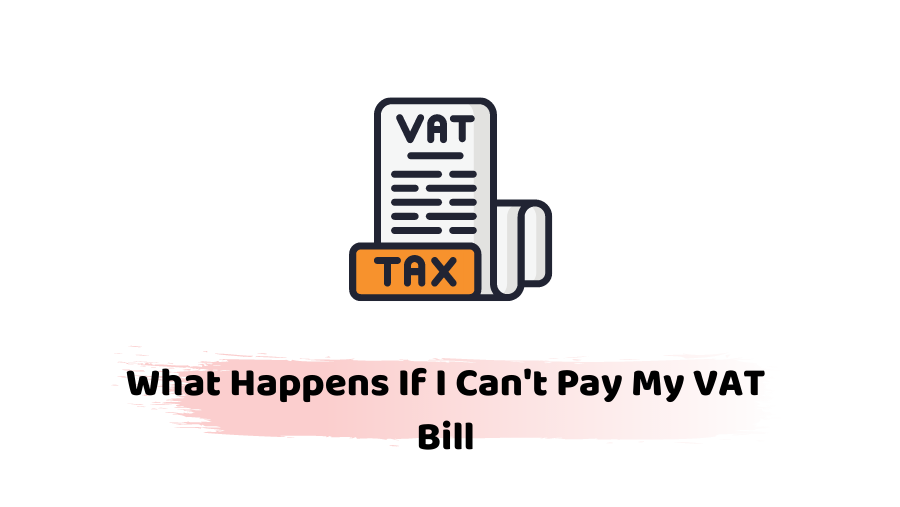Wondering what happens if I can’t pay my VAT bill? If you are unable to pay the tax bill or VAT, the first thing you need to do is to contact HMRC as soon as possible, as it will now allow you to be in this position for an indefinite period. Whether you have missed a deadline or know that you won’t be able to pay the tax bill on time, get in touch with HMRC promptly.
Few options are available to restructure your payments for the future. You can benefit from Time to Arrangement to pay your dues in the form of an affordable instalment plan. The inability to pay taxes, business costs and creditors may indicate that your business is insolvent or is heading towards it.
So, read on to find out what happens if I can’t pay my VAT bills. And what options to opt for.
Be worry-free about your VAT concerns by getting in touch with Accotax’s VAT accountants!
What Happens If I Can’t Pay My VAT Bill?
When HMRC doesn’t get the VAT return payment from you on a specified date, it will consider you insolvent. Initially, you will be sent an automated letter by HMRC, but later they will review it manually. In such instances, directors become hopeless and consider it as the business’ demise. However, they need to be vigilant and take prompt action to be on the safe side.
If you are not in a position to pay your VAT bill, these are the options available:
1) TTP Option: You may reach out to HMRC for support. Time to Pay arrangement with HMRC (TTP) can be a cost-effective way to pay your tax bill. HM Revenue and Customs (HMRC) may support you by allowing you to make unpaid VAT payments through monthly instalments across a maximum of 12 months.
2) Closure options – In case if your business is going to be default, it can use a Company Voluntary Arrangement (CVA) or Creditors’ Voluntary Liquidation (CVL) to pay the due liabilities over a defined period. You may also negotiate new terms with HMRC or dissolve the company if needed.
3) Enter Administration or Pre-Pack Administration: Another option is to get help from an Insolvency Practitioner (IP) to save the business from insolvency.
Whatever circumstances your business is going through, the company’s directors need to take immediate action to resolve their financial problems to secure their creditors and the business. In this regard, seeking help from a professional insolvency practitioner will prevent VAT arrears from getting bigger.
Hiring an accountant will save you and your business from being insolvent. Feel free to contact us to get inclusive accounting services at a reasonable rate. Get an instant quote right now!
For more details, visit the HMRC website.
VAT Surcharges
A surcharge is the percentage/interest of VAT that is not yet paid after the deadline of an accounting period that is in default. It goes up when you default again in a surcharge period. Here is the table to check how much you’ll be charged, when you default during the surcharge period.
| Defaults within 12 months | Surcharge if annual turnover is less than £150,000 | Surcharge if annual turnover is £150,000 or more |
|---|---|---|
| 2nd | No surcharge | 2% (no surcharge if this is less than £400) |
| 3rd | 2% (no surcharge if this is less than £400) | 5% (no surcharge if this is less than £400) |
| 4th | 5% (no surcharge if this is less than £400) | 10% or £30 (whichever is more) |
| 5th | 10% or £30 (whichever is more) | 15% or £30 (whichever is more) |
| 6 or more | 15% or £30 (whichever is more) | 15% or £30 (whichever is more) |
Note that you are not liable to pay a surcharge on the first default.
Once you are defaulted by HMRC, you will then enter into a 12-month surcharge period. If you default again during this time:
- the surcharge period will stretch to an additional 12 months
- you may be liable to pay an extra cost (surcharge) in addition to the VAT that is due
On submitting a late return, you won’t need to pay a surcharge if you:
- have no tax to pay
- pay your VAT in full on time
- are due a VAT repayment
HMRC will let you know about any surcharges you need to pay and the consequences of another default.
Still, have a question? Get in touch with us.
Penlites of Not-Making VAT Payments
If you are unable to pay VAT to HMRC, they will levy penalties on you along with the surcharge. HMRC may penalise you:
- Up to 100%, if you make a deliberate or careless mistake
- 30%, when HMRC sends you a VAT bill that is underpaid and you don’t inform them within 30 days
- £400, If you send paper VAT return instead of online (unless you are officially exempt from it)
Summing Up
So, now you have got the answer to what happens if I can’t pay my VAT bill. In a nutshell, non-payment of VAT is a serious issue on which HMRC aggressively takes rigorous action. In addition to the surcharges, they also levy penalties. Therefore, you need to be in touch with them all the time, instead of putting your head in the sand. As non-payment of VAT may lead to a winding-up petition, forcing your business into compulsory liquidation. There are different options available to tackle the issue.
Seek help from our accountants and insolvency practitioner for advice to save your business from insolvency. Reach out today!
Need a customised offer? Get an instant quote right now!
Disclaimer: This blog is just for general information on the above topic.





















































